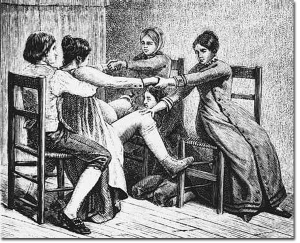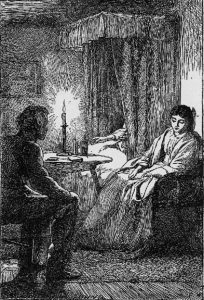John Castle (1819 – 1888): Home & Family

http://www.janeausten.co.uk/developements-in-childbirth-in-regency-and-victorian-england/
I am going to refer to an idea I previously brought forward in my Purpose and Audience entry, the idea from David Vincent of an author’s reticence[i], with particular emphasis on authors leaving out their emotional experience of family life. This reluctance to divulge much information about family life and hardship can be taken to mean one of two things. One is the traditional notion of privacy and that a person’s home life is personal. The second is the idea that it is simply not interesting. The first of these two is a perfectly accurate assumption and I am sure relevant to many working class memoirs. It is not relevant to John Castle. The reason I can be so unequivocal about this is by judging the very small sections of family life that he does include. However first I think it important to recognize the context of his family life. Castle had his first wife die when he was aged just twenty-four before marrying his second wife who had eight children, with at least two dying at young ages. A son, John, dies at three months and a daughter Esther her age not given, although it was certainly older as she was able to speak. This may seem tragic to a modern audience, and it is, but it was also a common reality of 19th century working class life. Therefore what we actually see in John Castle’s memoir is a few chosen passages of some tragic family events. John and his daughter Esther share a poignant moment before her death:

http://graceelliot-author.blogspot.co.uk/2012/05/death-on-walls-poison-in-victorian.html
‘She asked me if the doctor meant she was dying? I said “yes”. She said “let me look at myself in the looking-glass”. I did so. I shall never forget her earnest look at me. She said “oh, father, pray for me”. I said “I always do, dear; but you know it is needful for you to pray for yourself”. She said, with great emphasis “I do pray for my very heart” (29)’.
This is a harrowing scene. The inclusion of this brief and only instance in the memoir of true emotive love between Castle and a family member is due to the uniqueness of the dialogue. To summarize it crudely would be to say that it has the emotive power and feeling of a film. It’s inclusion in the memoir is because it is in some way unusual rather than simply the tragedy of it.
The last point to raise concerning home and family is speculative but perhaps true, it is impossible to tell. It is that Castle does not mention his family to must extent because he simply does not see their importance to himself. As I have said I feel he does not consider them relevant to the memoir because it focusses mainly upon work, education and society. What if Castle simply did not value his family at all? The passage inserted above would lay testament against that but there are many other instances of great emission. Only three of eight children are mentioned. When Castle married his first wife, Elizabeth Sandford , the death of her father meant that he and his wife were responsible for Elizabeth’s siblings. Castle suggests he did not want to take care of the children; ‘I . . . advised her to let the parish take charge of all of the children. To my surprise she brought a brother and a sister home to my house . . . I could not say anything to her’ (16). I am not trying to state that John Castle was anything other than a loving father to his children and husband to his wife, merely the point I am making is that from his emissions it is possible to think of several perspectives.
[i] Vincent, David. ‘Love and Death and the Nineteenth-Century Working Class.’ Social History, 5.2 (1980): 223-247
.

Leave a Reply